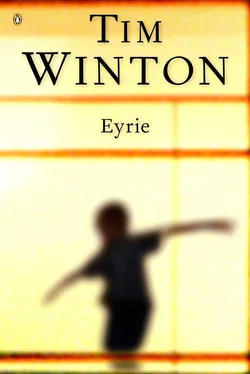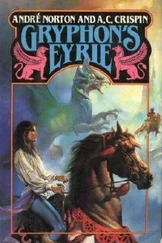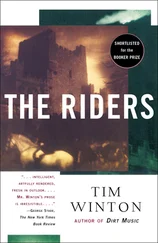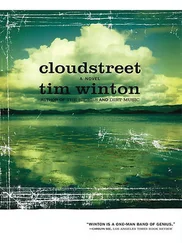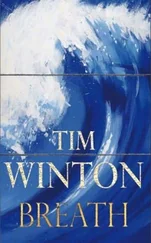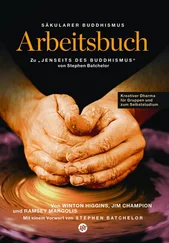Keely went for him. Felt the boyish thinness of his flashing wrist. And heard the knife before he saw it.
The blade clattered to the floor and Clappy stooped a moment before drawing back, glancing again at the table behind them. Keely grinned at him. Clappy blinked, chewed the air a second and then fled, crashing out onto the gallery, leaving Keely with a hot flush of relief coursing through his guts.
Somewhere in the building there was singing. Eggs were being fried. Next door his neighbour chanted metrically, musical as a nursery rhyme. As he staggered out onto the walkway the east wind rose in his face. It tasted of dust, of crops, the great country. He heard a siren. Every fingertip began to spark. He felt lightheaded with overcoming. He was larger than himself. His legs shook.
And now, in nothing but a T-shirt, Gemma came running his way.
Where’s Kai? he said.
Up here, she cried. He’s safe.
Go back, he said. Get inside.
Lie down, Tom. They’re coming. The cops, the ambo. God’s sake, you need to lie down!
He heard her calling, left her behind on the gallery as he set off. I’m the one, he thought. This little prick hasn’t seen the last of me. I am the one.
He didn’t bother with the lifts. He surfed down the stairs, thudding through every steel-railed right angle with the wind in his ears. Pursued by his own gathering momentum, he felt stronger and faster by the second. He was peaking. He felt power in his teeth, a great force pressing for escape.
At every floor the lift trundled ponderously earthward in the shaft. Clappy like a rat in a box. And Keely was close, in touch, nearly there, ready.
In the lobby, he crashed against the closing glass doors, saw the dark figure sprint across the forecourt into impossible light swarming with dim figures that surged away, crying out in consternation. The glass drew back and he was out there in the white world, in a field of stars and specks, of dancing sun. Faces loomed and bodies twisted aside as he ran on squelching feet. Ahead on the street there was a howl of braking tyres. Screams. And then people. So many people. Coming. Surging in, a gathering flock of heads and legs. Whatever was out there on the road, whatever had happened at the kerb, it was waiting for him, just within reach. He swam the hot air, reaching, clawing the breeze towards the flare of turning faces, open mouths, buffeting against the empty space of morning, puzzled, happy, still reaching.
So why the pavement, sudden and hot against his face? Palms scorched. Cold feet slippery-wet. He rolled to a shoulder, fell back strangely breathless to see the purling sky and the pink finger of the building above him. The world flashed outside him, shuttering light, stammering sound. A circle of dark heads in hoods enclosed him, offering moments of merciful shade.
Sir?
Dark-skinned noses, black eyes, pieces of face through the letterbox slits of cloth.
Sir? said the pair of spectacles, the swatch of human shape behind. Sir, are you well?
The veiled faces retracted uncertainly and Keely understood. He’d fallen. He saw the tower beyond and the tiny figure of the boy safe on the balcony. He smelt salt and concrete and urine. Saw lovely brown thumbs pressing numbers, cheeping digits, reaching down. The edit was choppy. The boy’s face a flash — or was that a gull?
Sir, there is bleeding. Are you well?
Yes, he said with all the clarity left to him. Thank you. I am well.
Tim Winton has published twenty-five books for adults and children, and his work has been translated into twenty-eight languages. Since his first novel, An Open Swimmer , won the Australian /Vogel Award in 1981, he has won the Miles Franklin Award four times (for Shallows, Cloudstreet, Dirt Music and Breath ) and twice been shortlisted for the Booker Prize (for The Riders and Dirt Music ). He lives in Western Australia.
